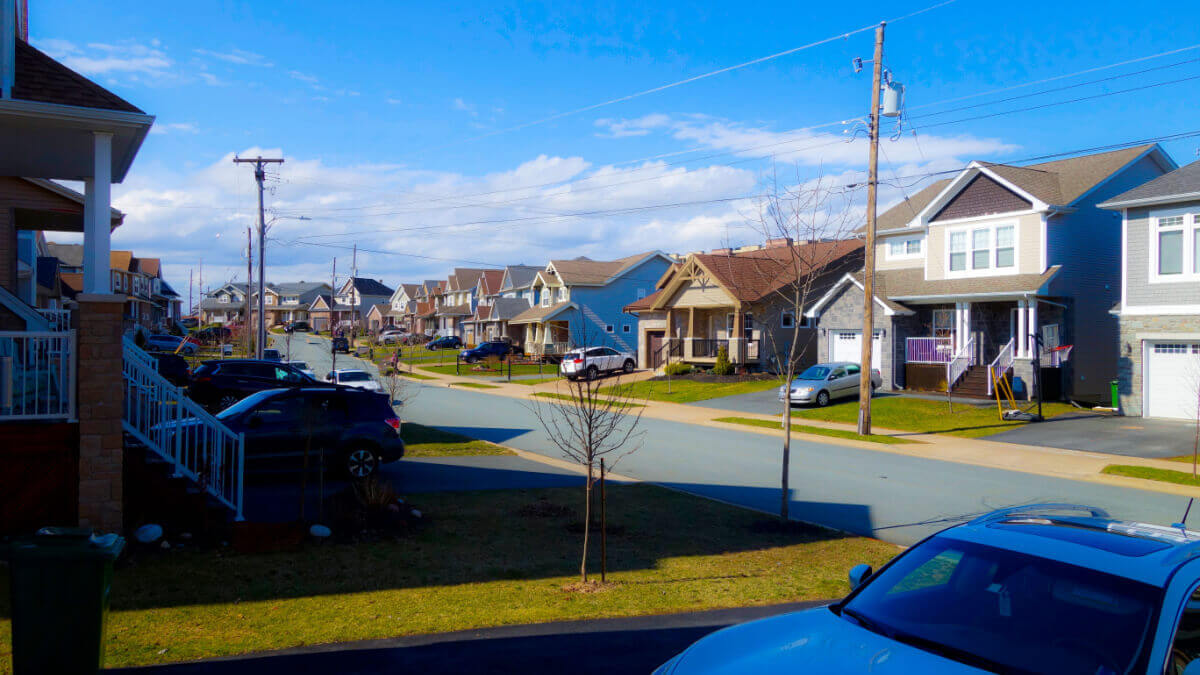How much money do you need to immigrate to Canada via Express Entry?
What are the requirements to get a permanent residency via Express Entry, how much money do you need, and how does it work. Read this article to find out

Nova Scotia continues to charm individuals from distant lands, looking for a piece of its picturesque allure and relaxed lifestyle. It tops the list in Canada for out-of-province real estate investors (3.8%), signalling a genuine national interest.¹ The province also ranks sixth for the most affordable province to purchase a home, and 66.8% of the province's residents own their homes - a clear sign of a stable real estate landscape.²⁺³ So why not hop on board and make a move or an investment? Here’s everything you need to know as a non-resident buying property in Nova Scotia.
The Nova Scotia property market has always been ripe with opportunity, relatively stable compared to the rest of Canada, and distinct.⁴ Housing and rental prices have seen a steady development over the years.
In 2022, the average house price reached an all-time high, and thus the quiet real estate market became much louder. This was likely due to cultural shifts and the shift to remote working. Since then, though, the market has cooled, with a 26.8% decrease in February 2023 compared to the February of the year before.⁵
The big question for newcomers is, 'To rent or to buy?' While statistics show that the majority of Nova Scotians go for home ownership, renting can also be a cost-effective and flexible choice if you’re testing the waters or looking for a temporary stay. But, of course, the potential long-term benefits of owning a property in such a robust market often sway in favour of buying.
The recently enacted "Prohibition on Purchase of Residential Property by Non-Canadians Act" presents a bit of a roadblock, as it prevents non-Canadians (unless you’re a temporary resident) from buying residential property in Canada for a period of 4 years (unless extended) starting January 1st, 2023.⁶⁺⁷
But don’t give up just yet – it doesn’t put an absolute bar on your plans of owning a property in Nova Scotia.
The Act serves to guide non-Canadian buyers toward less urbanized areas. If the home you want to buy is located outside of Census Metropolitan Areas (CMAs) and Census Agglomerations (CAs), you're in luck!
If you’re unsure whether this is the case, you can find out using the Census Metropolitan Area and Census Agglomeration Guidance Tool.⁸
| Are non-residents allowed to | Yes/No |
|---|---|
| Rent a residential property as tenants | ✅ |
| Rent a residential property as landlords | ✅ |
| Buy residential property in a CMA/CA | ❎ - until 1st January 2027 (unless extended) |
| Buy residential property outside of a CMA/CA | ✅ |
| Sell residential property | ✅ |
While most steps will be quite similar to buying a property as a local, there are some guidelines and documentation that you’ll want to have handy.
| Type⬇️/City➡️ | Halifax⁹ | Sydney¹⁰ | Dartmouth¹¹ |
|---|---|---|---|
| Apartment (1 bed) in city centre | 1,787 CAD | 1,275 CAD | 1,567 CAD |
| Apartment (1 bed) outside city centre | 1,489 CAD | 1,000 CAD | 1,367 CAD |
| Apartment (3 bed) in city centre | 2,969 CAD | 1,867 CAD | 2,017 CAD |
| Apartment (3 bed) outside city centre | 2,318 CAD | 1,533 CAD | 1,750 CAD |
Hiring an agent or going through an agency is one of the most popular methods. However, there are pros and cons to using this method, including the fact that the average real estate agent will charge a property commission of 5% in Nova Scotia.¹² Here are a few others:
| Advantages | Disadvantages |
|---|---|
| Expertise in local property market | There are agent fees applicable |
| Skilled at negotiation for better deal | Potential for conflict of interest |
| Understands legal requirements and paperwork | Not all agents may emphasize with specific needs |
| Helps with property showings and inspections | Process could be slower if agent is handling multiple clients |
| Provides access to a wider range of properties | The right agent might be hard to find |
Buying a property is a big deal, and navigating a foreign property market can sometimes come with a risk of scams or unprofessionalism. Verify the sellers' authenticity by cross-referencing them through industry directories and associations such as the Nova Scotia Association of REALTORS® or the Better Business Bureau. Professional agents should be able to provide credentials and selling history.
When dealing with agencies, go for ones with positive online reviews and a strong market presence. They should also have a real, physical address, not just an online presence.
If a deal seems too good to be true - walk away. Rushed deals, pressure tactics, or overly cheap properties might signal a scam. That’s why you should have a trusted attorney review contracts and agreements before you sign.
As for avoiding common mistakes, do your due diligence and understand all the legal and financial consequences. Are there any hidden or extra costs? What are the terms of your mortgage? Are you aware of the tax obligations? Don’t skip a home inspection either!
To help start your search, here are three reputable property agencies with significant online presence for the Nova Scotia market.
Choosing the right property can truly have a big impact on your living experience in Nova Scotia. Consider the type of property you’re going for and its condition.
Though not a legal requirement, hiring a licensed home inspector or surveyor to evaluate the property will give you a complete picture of the property's current condition. After all, you’ll want to save yourself from unexpected repair costs in the future.
While the seller might give you a property disclosure statement outlining any issues, an independent inspection will add an extra layer of protection for you as a buyer.
To find a reputable surveyor or home inspector, check out local directories, referrals, or industry associations like the Canadian Association of Home & Property Inspectors (CAHPI).
Having a lawyer or notary is vital, as they’ll understand the many contracts and agreements that you'll be entering, be able to offer legal advice, and make sure things are in your best interest. They're responsible for handling the closing process, registering the deed in your name, and making sure all legal and financial obligations are taken care of.
Even though Nova Scotia law doesn’t require the involvement of a translator, hiring one might be useful if English is not your first language, so you can fully understand all legal documentation.
You'll also need to register your property after the purchase. This is usually done by your lawyer and establishes the transfer of ownership from the seller to you, officially making you the rightful owner of the property.
Now that we've navigated through the initial stages of buying a property, let's explore the world of deposits, down payments, mortgages, and bank loans.
Canadian banks require you to either be a Canadian citizen, a permanent resident, or at minimum, a temporary resident or hold a valid work permit to get a loan.¹³ In this case, you should secure financing in your home country. This path might come with its own set of challenges, like exchange rates and foreign transaction fees, so you might want to contact a financial advisor familiar with international property purchases.
To get a mortgage, you’re required to have an active Canadian bank account. Luckily, there are plenty of major Canadian banks that offer banking to non-residents, including the Royal Bank of Canada (RBC), Toronto-Dominion Bank (TD), Bank of Montreal (BMO), and the Canadian Imperial Bank of Commerce (CIBC).¹⁴
Getting a consultation is as simple as visiting a nearby branch or scheduling an appointment online. But, foreigners should brace for additional requirements such as providing foreign income statements, a credit check from their home country, and more.
Down payments typically sit at around 5-10% of the property's purchase price for Canadian residents. For non-residents, financial institutions usually request a larger down payment - often around 35%.¹⁵
Wondering about making the down payment from abroad? Make sure your funds are put into a Canadian bank account 90 days before closing and that you have proof of the transfer.¹⁶
Digital platforms like Wise might just make the process that much easier. Wise allows you to send money across borders at the mid market exchange rate, often reducing bank charges and processing time.
With its transparent fees and user-friendly interface, you can get your down payment ready from the comfort of your home, anywhere in the world . It could work out to be a quicker, cheaper, and smoother way of making your property purchase transactions in Nova Scotia.
Please see Terms of Use for your region or visit Wise Fees & Pricing for the most up to date pricing and fee information.
Here’s an overview of the average taxes and fees you might have to pay when buying property in Nova Scotia as a foreigner:
Agency/Agent fees: 4% - 6%
Notary/Lawyer fees: Around 800 to 1000 CAD for legal fees along with 300 to 400 CAD for disbursements
Public Registration fees: Deed Transfer Tax to register the property - around 1.5% of the property’s purchase price
Taxes: Nova Scotia non-resident property tax of 2 CAD per 100 CAD of assessed value + tax adjustments if applicable¹⁷
One-time fees at time of purchase: Closing costs (typically 3% - 4%) in addition to the down payment¹⁸
Any additional fees: Home inspection fees range between 400 to 600 CAD along with HST tax, home insurance fees, potential foreign buyer’s tax, any renovations, maintenance fees for condos¹⁹
Exchange rate when paying mortgage/deposit: Banks and other financial systems often employ rates higher than the mid-market rate, leading to additional costs. Wise, on the other hand, provides the actual mid-market rate and can save you from these hidden charges.
Sources:
Sources verified on: 01 September 2023
*Please see terms of use and product availability for your region or visit Wise fees and pricing for the most up to date pricing and fee information.
This publication is provided for general information purposes and does not constitute legal, tax or other professional advice from Wise Payments Limited or its subsidiaries and its affiliates, and it is not intended as a substitute for obtaining advice from a financial advisor or any other professional.
We make no representations, warranties or guarantees, whether expressed or implied, that the content in the publication is accurate, complete or up to date.

What are the requirements to get a permanent residency via Express Entry, how much money do you need, and how does it work. Read this article to find out

Canada is home to large expat communities, as well as many foreigners who enjoy visiting for vacations, or to work or study for a short period. If you’re a...